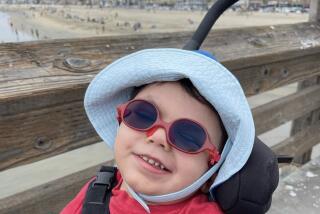Infant With Partial Brain Dies; Organ-Donor Appeal Too Late
MIAMI — The short life of Theresa Ann Campo Pearson ended Monday, nine days after she was born without a fully formed brain. The troubling issues that the tiny infant’s life raised live on.
The four-pound baby died Monday at Ft. Lauderdale’s Broward General Medical Center, about 19 hours after she was removed from a ventilator that briefly had sustained her when her vital organs began to fail. Her parents, Laura Campo and Justin Pearson, were at her side, doctors said. The cause of death was cardiac and respiratory failure.
Since the girl was delivered by Cesarean section March 21, her parents had been battling for legal permission to have her heart, lungs, kidneys and liver removed so they could be donated to children who need organ transplants. Two Florida courts found that state law prohibited taking vital organs from anyone who was not brain dead.
Late Monday, the Florida Supreme Court agreed to hear the couple’s appeal, but by then it was too late.
In fact, doctors said, it was too late for Thersea Ann within days of her conception. She was born with nothing but the nub of a brain stem--enough to provide her with only breath and a heartbeat. She had no brain, an incomplete skull, no feeling or cognition and no hope, said her neonatologist, Dr. Brian Udell.
By the time of her death, her organs had deteriorated and would not have been useful for transplants, said Les Olson, director of organ procurement for the University of Miami. But the corneas of her eyes were saved, and will be given “to another tiny baby,” Olson said.
Most anencephalic children are stillborn. Of those born alive, the vast majority die within minutes. Theresa Ann lived, unaided by mechanical life support, for eight days.
“Theresa’s legacy is that now, hopefully, people in this country will understand what brain death is,” Olson said. “Organ donation is the only loving thing to come out of the death. But the only candidates for organ donation are those cases where the patients are kept alive artificially. She was not a suitable donor.”
More to Read
Sign up for Essential California
The most important California stories and recommendations in your inbox every morning.
You may occasionally receive promotional content from the Los Angeles Times.









